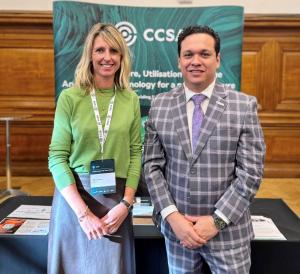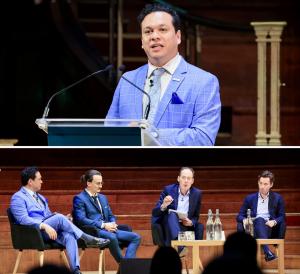The Low-Carbon Diplomat at the Forefront of Carbon Capture History in the U.K. and Brazil
RIO DE JANEIRO, BRAZIL, December 4, 2024 /EINPresswire.com/ -- October witnessed global carbon capture history: Brazil established South America's first Carbon Capture Storage (CCS) legal and regulatory framework, while Europe, via the U.K., pledged more than $28 billion to fund its first CCS projects, tangibly sparking international CCS momentum. In this context, Fernando C. Hernandez, the Society for Low Carbon Technologies’ (SFLCT) Chairman of the Board, has been active in low-carbon diplomacy activities on both continents1 prior to such achievements. For example, as CCS Brasil's International Chairman, he played a supporting role in the passage of Brazil's CCS framework2 and engaged with the U.S. Department of Energy on the matter. Importantly, CCS Brasil's Co-Founders, Nathália Weber and Isabela Morbach, provided crucial strategic direction for this endeavor.
Furthermore, Olivia Powis, the CEO of the European-based CCSA, collaborated with Hernandez in these transatlantic efforts after they met in Rio de Janeiro, Brazil, in June during a global panel in which they both participated. Their global CCS view reunited the pair in October at the CCSA's flagship conference in the U.K., where Hernandez moderated a low-carbon panel. His close ties to the U.K.'s CCS community, as a multi-award-winning technologist at the Net Zero Technology Centre and a Scottish Government Business Ambassador (GlobalScot), enhance his involvement in Europe.
The low-carbon diplomat expressed that the conference's diverse stakeholder engagement, including those crucially connected to the CCSA and involved in the multi-billion-dollar pledge for CCS projects, made it noteworthy. He adds that these factors led the conference to appear as the epicenter of carbon capture in the U.K.
Hernandez goes on to remark, "Moderating in London right after the historic milestones carried surreal gravitas, but I tactfully emphasized to attendees the U.K. and Brazil’s need to collaborate as they enter new frontiers." He highlights that while both nations will have unique CCS strategies that reflect their respective regions, their combined efforts to decarbonize demonstrate how diverse and nationally tailored approaches can align under a shared commitment to achieve net zero. Owing to his established connection with the U.K. and Brazil, the low-carbon diplomat aims to spark cross-sector collaborative agreements to further the global low-carbon domain, as Hernandez has already done between Pakistan and the U.S.3
Additionally, Powis during the conference expressed how, “The CCUS industry is on the cusp of deployment, and with supportive policy frameworks being developed across key markets, there is global momentum to see projects get off the ground, with further investments being considered into important anchor projects.” Hernandez states how these historic acts offer a once-in-a-generation opportunity for the U.K. and Brazil to decarbonize their industries, create thousands of employment opportunities, and advance low-carbon technologies, thereby supporting net-zero targets and promoting sustainable economies that benefit the biosphere. He concludes by congratulating all involved in making these watershed acts possible and advancing the low-carbon realm.
Press Relations
Society for Low Carbon Technologies
email us here
1 https://carboncapturemagazine.com/articles/the-diplomatic-technologist-connecting-nations-in-the-carbon-capture-space
2 https://jpt.spe.org/brazils-moves-toward-becoming-the-first-south-american-nation-to-pass-ccs-legislation
3 https://www.einpresswire.com/article/728366067/the-society-for-low-carbon-technologies-strengthens-global-ties-with-a-strategic-pakistani-partnership


